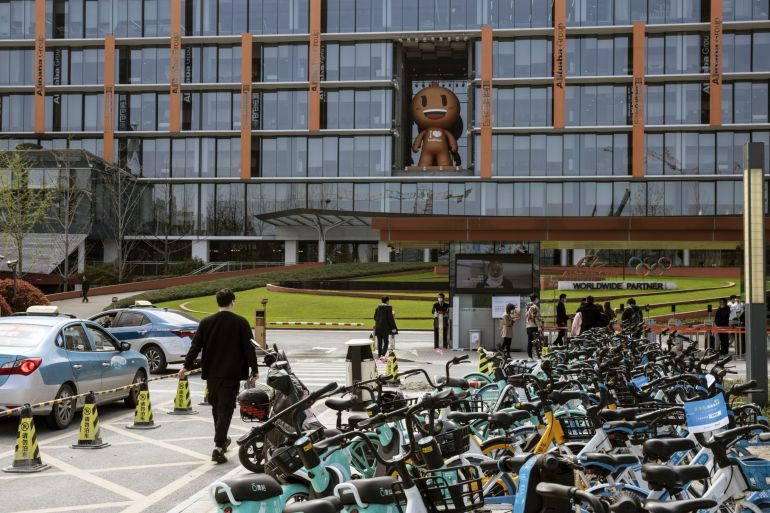Rocked by sexual assault complaint, China’s Alibaba fires manager
Critics say Alibaba failed to act until the female staffer went public with her allegations on the firm’s intranet.

Chinese e-commerce giant Alibaba Group Holding Ltd has fired a manager who allegedly sexually assaulted a female employee and will establish policies to prevent sexual harassment, Chief Executive Daniel Zhang said on Monday.
The manager – at Alibaba’s City Retail unit, which offers grocery delivery from local supermarkets – “has been fired and will never be rehired”, Zhang said in a memo published on Alibaba’s intranet that was seen by Reuters.
Keep reading
list of 4 itemsAlibaba facial recognition tech can identify Uighurs: Report
China launches antitrust probe into technology giant Alibaba
Ma’s wealth soars $2.3bn after China imposes milder Alibaba fine
The man told management there were “intimate acts” with the employee when she was inebriated, Zhang said in the memo, adding that the police is investigating the matter.
Reuters was unable to reach the individual for comment.
“Alibaba Group has a zero-tolerance policy against sexual misconduct, and ensuring a safe workplace for all our employees is Alibaba’s top priority,” a company spokesperson told Reuters when asked about the memo.
Over the weekend, a female staffer posted an 11-page account on Alibaba’s intranet in which she said her supervisor and a client sexually assaulted her while on a business trip, and that managers had failed to take action.
Threads related to the incident subsequently ranked among the top-trending on Weibo, China’s Twitter-esque microblog, which has been alight with discussion of the #MeToo anti-sexual harassment movement following a celebrity sex scandal last week.
Zhang said the City Retail unit’s president and human resources head had resigned over the incident, and that Alibaba’s chief people officer has “received a demerit”.
Investigations into other individuals referred to in the victim’s account are ongoing, Zhang added in the memo.
Alibaba will conduct company-wide training for the prevention of sexual harassment and launch a channel for staff to report incidents, Zhang said in the memo. It will also issue a formal, zero-tolerance anti-sexual harassment policy.
Zhang also said Alibaba is staunchly opposed to “the ugly culture of forced drinking”.
The memo detailed the victim’s account of the incident, in which she recalled superiors ordering her to drink alcohol with coworkers during dinner on a business trip.
“Regardless of gender, whether it is a request made by a customer or supervisor, our employees are empowered to reject it,” Zhang said in the memo.
“This incident is a humiliation for all Alibaba employees. We must rebuild, and we must change,” he said.
Failure to act
Many of the comments over the weekend centred on Alibaba’s failure to act until the allegations went public. The scandal engulfed Alibaba just as it is trying to move past a bruising months-long investigation by antitrust regulators into monopolistic behaviour such as forced exclusivity, which helped kick off Beijing’s current broad campaign against online industries from ride-hailing to fintech and education.
Alibaba has become the highest-profile symbol of abuses regarded as prevalent throughout Chinese businesses and at tech firms, rooted in a hard-charging environment that often prioritises profit and achievement over culture.
The #MeToo movement first came to prominence there in 2018 when allegations against a professor at a Beijing university were published on social media. Since then, a number of allegations have been made against academics, environmentalists and journalists.
In one of the highest-profile incidents so far, JD.com Inc. founder Richard Liu was arrested in the United States in 2018 and accused of raping a 21-year-old female Chinese undergraduate, though prosecutors there subsequently decided not to press charges against the billionaire.
More recently, former Korean boy band member Kris Wu has been detained after a university student accused him of pressuring young women into sex.
“I expect the biggest impact to be recruitment and talent management,” said Michael Norris, an analyst with Shanghai-based consultancy AgencyChina. “Alibaba’s growth required a strong talent pipeline across various business units. This incident may dissuade promising female graduates and highly-qualified female managers from joining Alibaba.”
But the country’s largest corporations have thus far been largely shielded from the upheaval of the #MeToo movement in the West, in part because of a lack of recourse for reporting incidents and longstanding sexist norms. Businesses also have tended to deal with gender discrimination away from the public spotlight. From hazing rituals during which women simulate sex acts to forced drinking and job ads that use women as bait to lure male workers, sexism remains endemic particularly in the tech industry.